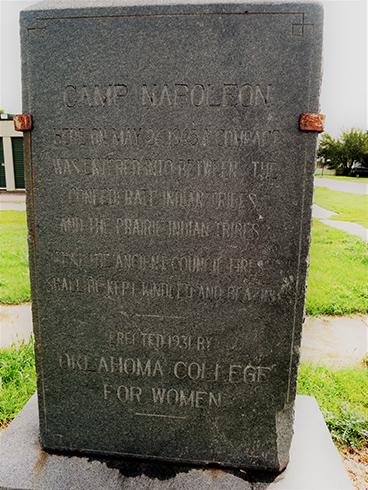The route of the Fort Cobb Trail as it passed through modern Verden ran close to a cluster of towering cottonwood trees that gave the area the name Cottonwood Grove. This grove may have been located at the far western edge of the town limits of present-day Verden. In 1865, a meeting place designated as Camp Napoleon[1] near Cottonwood Grove hosted one of the of most historic mks rolex day date 40mm m228396tbr 0020 mens green dial Indian conferences ever convened in what would later become Oklahoma. As summarized, this council was memorialized by Dr. Anna Lewis, a history professor at the Oklahoma College for Women in Chickasha[2] from 1917 until 1956, in the December 1931 edition of the Chronicles of Oklahoma:[3]
Disorder and uncertainty reigned in Indian Territory during the last year of the Civil War. Most of the leaders of the five civilized tribes realized they were being used to protect the Confederate States bordering their lands and the Confederacy had done little for them in return.
Internal problems existed as well. Bands of outlaw Indians stole cattle from tribal ranchers and the Cherokee and Creek tribes warred among themselves. The Plains Tribes still had not accepted the boundaries to their lands imposed by the US government and the five civilized tribes, particularly the Choctaw and Chickasaw, believed it increasingly likely that the Plains Tribes would launch attacks on them.
With the intent of forming a mutual-protection compact between all the area tribes, a great council meeting was called for May 26, 1865, at Camp Napoleon at a place known as Cottonwood Grove. As the tribes arrived to participate in the council, their camp sites encompassed the entire area of the present-day town of Verden.
Tribes attending the council included the “Cherokees, Choctaws, Muskogees, Seminoles, Chickasaws, Reserve Caddoes, Reserve Osages…the Kiowas, Arrapahoes, Cheyennes, Lapan…several bands of the Commanches, the Nacones, Cochateks, Senawuts, Yameparckas, and Mootchas, and Jim Pockmark’s Band of Caddoes, and Annadahkos of the second part…”
The Indians collectively believed they were taking action to ensure the very future of their existence. They pledged peace and friendship forever between all the tribes who entered into the compact and swore to keep the Ancient Council fires “kindled and blazing by brotherly love.” The tomahawk was to be “forever buried” and the scalping knife “forever broken” as an Indian “band of brothers” pledged to protect one another.
The overarching promise of the Camp Napoleon Council was that “An Indian shall not spill an Indian’s blood.”

A monument commorating this historic Indian gathering was erected in 1931 by the Oklahoma College for Women. Worn and braced upright some 87 years later, the monument bears the following weathered chiseled words:
Camp Napoleon
Here on May 26, 1865, a compact was entered into between the Conferate Indian tribes and the Prairie Indian tribes that the ancient council fires shall be kept kindled and blazing.
The Camp Napoleon Council was ultimately unsuccessful in preserving the Indians’ way of life. The monument to its great effort is located on the southeast corner of the intersection of US Highway 62 and 4th Street in Verden, Grady County, Oklahoma. The event it memorializes occurred just over a third of a mile south of the old Fort Cobb Trail.
[1] Author’s note: The only known mention of Camp Napoleon in the historical record of the area is as the site of the Indian Council. The origin of the camp’s name and its purpose are unknown.For more samsungs galaxy tab s9 serie kann jetzt vorbestellt werden or https://www.alienpuff.co.uk/product/50-alien-puff-black-gold-1-1-4-size-unbleached-brown-rolling-papers-hp104-000991/, please visit great site for information.
[2] Author’s note: Also known as OCW, the Oklahoma College for Women is now the University of Science and Arts of Oklahoma, or USAO.
[3] Dr. Anna Lewis, “Camp Napoleon,” Chronicles of Oklahoma, Vol. 9, No. 4, (1931), accessed 2 September 2018, https://cdm17279.contentdm.oclc.org/digital/collection/p17279coll4/id/1459/rec/24, crediting Oklahoma State University, Stillwater, OK
